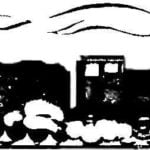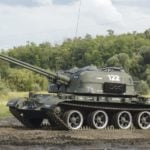The idea of composite, or multi-stage rocket put forward by K. Tsiolkovsky in 1929. And on may 19, 1938 near Moscow for the first time in the world was launched two-stage rocket designed by I. A. Merkulov, one of the veterans of Gird.
Structurally, these missiles can be divided into two types: transverse and longitudinal division steps. Perhaps longitudinal-transverse division: it is this arrangement have launch vehicles spacecraft “Vostok” and “Soyuz”.
Models of missiles widely used cross-division steps, thus they should not be more than three. For the first stage it is necessary to use engines with greater thrust, the second and third can set marching with a constant thrust.
The shape of the stabilizers chosen such that their tips were located outside the cut of the bottom (lower) side of the engine. On the starting (first) level stabilizers should be larger than the following. This will ensure that models the necessary stability in flight.
The two-stage MODEL ROCKET (Fig. 1). The housing is made from two layers of drawing paper blank Ø 22 mm. First, glue the second (upper) tier, then it is first. Its inner diameter is equal to 23 mm.
In the lower part the two parts are glued to cartridge paper to tight the engines were left in the case.
Stabilizers (at each stage three) — made from plywood: for the first stage of 1.5 mm thick, Vira — 1 mm. Attach a “butt” to the body and strengthens the paper corners.
Guide rings of paper in three layers. They attach to nitroblue only to the first stage. Fairing machined on a lathe out of birch. Since the model is designed to start at altitude, the diameter of the parachute choose the small — 300-350 mm, to Make it out of paper or thin silk.
All the missile cover with three layers of nitrocellulose lacquer, carefully polished and painted with nitrocellulose in a contrasting colour. The starting weight should be between 110 g.
To prepare for the flight. First install the engine in the first stage, and then, in the second case. The transmission of the firing pulse is carried out using a wick (stopia), impregnated with a combustible composition.
A three-stage MODEL ROCKET (Fig. 2). Body of paper in two layers glued together on a mandrel Ø 23 mm Connection — clip-bushing, glued into the second and third steps, the first clip only serves to secure the engine. The guide ring is attached to the body of the first stage.
Stabilizers made of plywood, 1.5 mm thick, glued to the hulls and the model is in the docked view will have one. You should pay special attention to the care of fitting them along the lines of the connector.
Fairing — birch, downloaded 50 G of lead. A parachute with a dome of Ø 300 mm made of silk.
The model is intended for competition at altitude.
A MODEL ROCKET EXPERIMENT (Fig. 3). With it you will be in competition at altitude, and use it for experimental research, if we need to raise the height of any payload.
The first stage has four engines with a momentum of 10 n with a fixed two frames from plywood thickness of 3 mm. the Body is made in the following way: two frames in the shape of a triangle with rounded tops are covered with three layers of drawing paper on top, attached the cone from balsa with a hole Ø 24 mm, which includes the housing of the second stage.
Stabilizers of the first stage is made of fake veneers 2 mm thick bonded with nitrocream and reinforced paper corners. Serves as a guide tube Ø 7 mm and a length of 50 mm. the weight of the first stage without engines 25 g.
The housing of the second stage paper tube Ø 24 mm, length 370 mm. the Stabilizer out of plywood with a thickness of 1.5 mm. fairing from birch, payload, or ballast, is 70 g.
In preparing the model for flight a peripheral first stage engines (three of them) need to seal tight — to remove the shaped charges.
V. ROZHKOV, master of sports of the USSR


